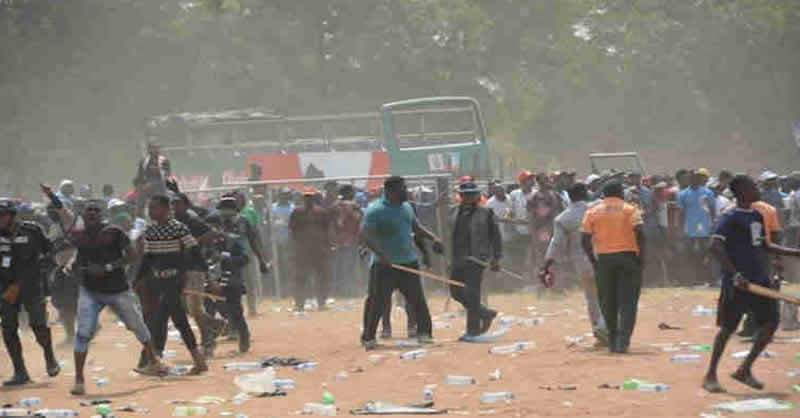File: Political thugs clash at a rally.
In the last four years, political thuggery has increased in Kano, Ekiti, Osun, Nasarawa and Borno states, a report by the Tony Blair Institute for Global Change has said.
The institute urged the Federal Government and security agencies across the country to make sure that the 2023 general elections did not descend into violence, following the already-heated polity as a result of the ongoing campaigns.
“Unless concerted efforts are made to maintain peace and ensure politicians respect the outcome of the election, 2023 may see a post-election period more similar to 2011 than to 2019,” the report, headlined by a senior fellow of the Institute, Bulama Bukarti, stated.
Nigeria’s bloodiest post-election violence erupted after the 2011 general elections, the report noted, saying, “ironically, that was the most credible electoral process up to that point.”
The announcement that the then-incumbent President, Goodluck Jonathan, had won the election, and that the main opposition candidate, Maj. Gen. Muhammadu Buhari (retd.), had lost, resulted in “three days of violent riots and communal unrest that left at least 800 people dead and 65,000 displaced”.
The institute further noted that the killings and destruction “followed religious and ethnic lines,” warning that the 2023 elections should not follow the same pattern.
The report, obtained by our correspondent on Saturday, was titled “Why the Security Risk to the 2023 Elections Must not be Overlooked.”
Citing instances from 2021 to date, the report stated, “Political thuggery has escalated over the past four years in Kano and taken a new dimension, with clashes between thugs operating for different politicians in the same political party.
“Both Kano State’s ruling All Progressives Congress and their main opponent, the New Nigeria Peoples Party, have publicly stated they would use thugs in the upcoming election, as the APC did in 2019. This sets the stage for an environment of violence and instability.
“Kano is not the only state showing early signs of violent political thuggery in the run-up to the 2023 election. Last January, the Nigerian Army arrested 98 armed thugs reportedly headed for Ekiti State in South-West Nigeria to disrupt the PDP’s primary election to nominate a candidate for governor.
“In June 2021, political thugs disrupted a collection of Permanent Voter Cards, ID cards that enable registered voters to participate in elections, in the Ilesa West Local Government Area of Osun State. This was immediately followed by thugs vandalising election materials and firing gunshots into the air, scenes that triggered a wave of chaos that led voters to disperse.
“Earlier in June 2021, the police arrested hoodlums suspected to have been hired by a 2023 senatorial candidate in Nasarawa State. They were travelling with weapons and bulletproof vests. On November 9, PDP’s presidential rally was attacked by political thugs during Abubakar’s campaign visit to the city of Maiduguri, with more than people injured and 70 vehicles damaged.
“The attack, which was disputed by the police but verified by several news outlets, reportedly killed one person and has been described by Abubakar as a violation of the NPC’s peace accord.
“These incidents offer a window into what appears to be a contingent of competitive politicians seeking to mobilise gangs and hoodlums to harass and pressure opponents, make voters fearful and commit electoral malpractice in the lead-up to the 2023 election.”
